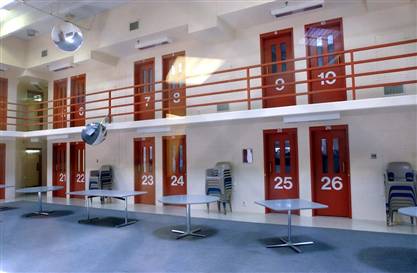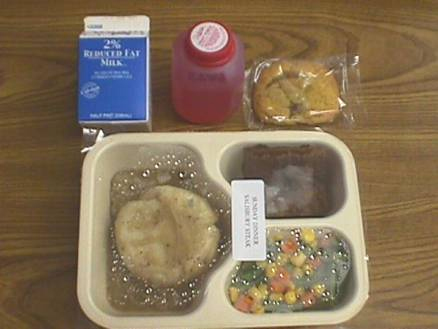This is Part III of a continuing series of posts based on my recollections of the time I went to jail for 24 hours as a journalist.

“You’re in 17.” The guard points to my cell.
And then the guard is gone.
The door closes with a heavy, steel sound somewhere between a click and a clang. I know the door will open for me again in 24 hours, but still it’s an ominous sound, not a sound you’d associate with anything good.
 I stand there in the entryway with my arms full of stuff. The first thing that hits me is the smell — air freshener pumped into air that is anything but fresh, only vaguely masking the odors of so many functioning bodies. Overhead, fluorescent bulbs make a mockery of the thin shaft of daylight coming from an almost opaque skylight, its view of the blue sky marred by bars.
I stand there in the entryway with my arms full of stuff. The first thing that hits me is the smell — air freshener pumped into air that is anything but fresh, only vaguely masking the odors of so many functioning bodies. Overhead, fluorescent bulbs make a mockery of the thin shaft of daylight coming from an almost opaque skylight, its view of the blue sky marred by bars.
I make my way across the crowded dayroom, a space smaller than the newsroom at my newspaper, to my cell. Inside the vault-like door with its little window — no bars — is a nine-by-nine space with a steel shelf that serves as a bed. Above it is a horizontal slit of a window about a foot wide and three inches tall that offers a tiny glimpse of the foothills — if you’re tall enough to see outside.
 Right in front of the door is the toilet, placed where women using it can be seen by any inmate or guard looking her way. I dread having to use it.
Right in front of the door is the toilet, placed where women using it can be seen by any inmate or guard looking her way. I dread having to use it.
Next to it is the sink. I push a button and a little trickle of water emerges to dribble down the side of the sink. Thirsty — it has been three hours since I “self-reported” for my “arrest” — I think of all the other inmates who’ve been here and wonder whether I want to drink water that is contacting the surface of the sink where they’ve spit their toothpaste and washed their hands. I decide to try the faucet at the front of the dayroom instead.
I drop my pile of stuff on the thin gray plastic pad that serves as a mattress and emerge, knowing that this is why I’ve come. I can’t hide in a cell all day.
In the dayroom, a handful of women are watching Dr. Quinn: Medicine Woman on the TV, which sits high above where anyone can get to it on a shelf. Another group sits around a table talking, their voices all but drowning out the TV. Still others sit talking in chairs on the upper level. So many voices in such a small space feels deafening.
 I fill a little paper cup and sit down, thinking that I’ll observe and get my bearings that way. I don’t sit for long.
I fill a little paper cup and sit down, thinking that I’ll observe and get my bearings that way. I don’t sit for long.
“Your fat ass is in my chair!” shouts a woman who is sitting in another chair nearby — perhaps she lays claim to several.
She gets up and stomps over to me.
I sit for a minute just to prove to her that I’m not afraid, then slowly stand, shrug and step aside.
“Yes, this is me, and I’m not afraid of you,” I try to say with my body language.
I decide not to point out that her ass is far fatter than mine and, with no place else to sit, I go to stand near the sofa, where women sit watching TV.
For a moment, they completely ignore me. Then one looks up and asks, “Why are you here?”
Why am I here? To learn about the experiences of women in jail. But I can’t really say that. So I tell the most unconvincing lie of my life.
“Murder,” I say.
Yeah, I bad. (Hey, if you’re going to do it, go all the way, right?)
Except that I’ve never done this before, and the word “murder” comes out like I’m telling her my astrological sign. Would a true murderer be some comfortable with that fact?
One of the woman’s eyebrows shoots upward in surprise, but her face stays cool. I don’t think she’s impressed.
No one else says anything.
Because that woman is still making eye contact, I pop my first question: “Does this place seem really crowded?”
 This — not my murder confession — gets their attention.
This — not my murder confession — gets their attention.
They tell me it’s not too crowded today but that there are times when the module is so full that the dayroom is filled with “boats” — plastic beds used as sleeping places when cells are all full to capacity. When that happens, the guards consider placing the women on 23-hour lockdown just to keep order.
I try to imagine spending 23 hours locked with another woman in my cell with one hour a day to shower or walk around. That’s 23 hours of drinking water that dribbles down the side of a sink, of using the toilet with another adult only feet away, of smelling another person’s bodily smells, of mind-bending boredom.
Then a very young woman introduces herself as Marie and tells me that her boyfriend is in Intake, where the men are always on lockdown because there are so many of them. The two have a 5-month-old baby who was taken away by Social Services, she says. Then, fidgeting with her jail wristband, she tells me she is three months pregnant. She hopes to go home after a court hearing today, but she isn’t sure what will happen. The uncertainty is clearly making her very anxious.
She doesn’t tell me why she’s here, but I see that her wristband is yellow, signifying high-risk status. I glean from a few hints that she and her boyfriend beat up on some guy and his girlfriend and that this isn’t her first arrest. She can’t be much more than 20.
The women drift back to watching Dr. Quinn, while I think hard about a little problem I have. In my short conversations with two inmates, I’ve discovered that I stick out like a sore thumb. With most of a master’s degree and years of writing behind me, I have a very different vocabulary. Not only that, but I have all my teeth. I have all my hair. I have healthy skin that isn’t yellow from chronic alcoholism or pale from heroin addiction.
I can’t do anything about the hair or the skin or my teeth. But I can change the way I talk. I need to break the ice somehow, if only to make myself feel more at ease.
Dr. Quinn’s lover, Sully, takes up the screen, and the women give a little moan in unison.
It gets quiet, and I say, “I want to do that man!”
There is a flurry of giggles, and I sense a slight thaw.
Lunch arrives — it’s not yet noon — and women line up single-file to pick up closed meal trays. A cooler full of grape Kool-Aid is put next to the sink under the TV. There is no milk, no fresh ice water. I ask and am told milk is served only with breakfast and supper.
I follow the other women’s lead, giving the guard my name and cell number. My name is checked off a list. I take my tray to a  table, sit down and open it. Immediately I lose my appetite. Peas, rice and beans float in brown sauce, looking more like vomit than food. Two slices of salami lie between two pieces of white bread. There are potato chips, a wrinkled apple, salt, pepper and mustard, but no mayo. Calories, but little nutrition.
table, sit down and open it. Immediately I lose my appetite. Peas, rice and beans float in brown sauce, looking more like vomit than food. Two slices of salami lie between two pieces of white bread. There are potato chips, a wrinkled apple, salt, pepper and mustard, but no mayo. Calories, but little nutrition.
“What do you think of the food?” asks the woman sitting next to me.
“I think I’ll stick with the potato chips,” I say.
I watch the women eat and trade food. In defiance of racial stereotypes associated with jail and prison, most are white. There are two Native Americans, two Latinas and one black woman. Judging by their speech, most seem to have left high school before graduating. I wonder what role economics or lack of education might play in their situation.
“The food makes you fat,” says the woman beside me.
I focus on my potato chips.

 For more on my time in jail or on Unlawful Contact, my April 1 release which was inspired by a decade of reporting on prisons, go to my website or my blog. Go here for an excerpt.
For more on my time in jail or on Unlawful Contact, my April 1 release which was inspired by a decade of reporting on prisons, go to my website or my blog. Go here for an excerpt.

Yikes! Talk about another planet!
It absolutely is another world, Devon. And it only gets weirder from there! I’m glad you’re finding the posts interesting.
The next few posts will cover Bible Betty, an elderly prison/jail minister who made me cry; the absolute freak-show of jail romance; what happens when two newly arrested meth addicts decide I need my head bashed in; a night of nonstop screams; and the understanding I emerged with the next morning.
Isn’t it amazing how intellectually we know that there’s a huge loss of liberty involved, yet it’s the little things that paralyze us? The water, the food, the lack of privacy… and the inability to leave if you get in hot water.
I did a Google Image search for “jail food” and yikes. NOT pleasant.
I’m finding this series to be fascinating.
Hi, Azteclady, it’s the little things. Just staying in a room for a period of time is no fun, but then the other things are what makes it really tough and dehumanizing. The toilet thing really got me. I actually had a nightmare after this of being in a room full of people who were all sitting on toilets with their pants down talking to each other. No stalls. No doors. Just a room full of toilets. I had to go, you know… but I just couldn’t get myself to sit there blithely and go potty with everyone else watching. It sounds silly but it really was a scary dream. LOL!
Hi, Gwen, I’m so glad this is interesting to you. Yes, jail food is rather disgusting, the result of cost-cutting I think. It costs about $30,000 to keep an adult behind bars for a year, and so people who run the jails and prisons look to cut costs. On the one hand, I understand. On the other, I think people would probably be healthier — particularly those who’ve got addiction and booze problems — if they got more healthful food.
Your series of posts on this experience is interesting…the situations you describe are so difficult.
This makes the idea of repeat offenders seem really bizarre. How can they take a chance of going back when they’ve been there? You have started me doing my own study of the subject (though I believe I’ll stick with vicarious research).
Hi, LLL — It’s a bad situation all the way around, with the inmates themselves acting as their own worst enemies often times.
Alicia, yes, to you and to me it seems insane that anyone could experience that once — and then do anything illegal again to wind up back in there. I’m definitely going to go into this later, where I talk about each woman’s story. Basically, I understand it this way now: Most women who land in jail are “dual-diagnosis,” i.e., they have mental-health issues like bipolar disorder that are combined with drug or alcohol addiction. And they’re much harder to rehabilitate than men because they grow emotionally dependent on “the system” and the other female inmates. Their entire support system becomes the friends they have behind bars.
One of the weirdest moments when I was there came when a woman, who’d been out for less than 24 hours, was thrown back in the unit for some kind of new arrest. I don’t want to spoil it by giving it away here. But often the women there have serious issues and seemingly no ability to recognize that they have any control or responsibility for what happens to them. It was very, very sad, even irritating, for me to see that.
Cool that you’re looking into it. What are you finding?
I’m just starting so I’ll wait and post my questions/comments later. Since I know about nothing about the topic, I’m sure you’ll be way ahead of me.
I can’t imagine anyone would take the risk of going back. I have had two friends spend the night in jail for DWI. Just one night for one was enough to make sure she has never done it again.
ever
The experience is one I can’t imagine.
The other was a guy and he didn’t learn his lesson the first time….